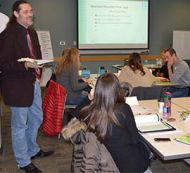Training educators to respond to early symptoms of mental illness is critical, and an approach 30 educators learned during a recent Mental Health First Aid training certification course at Kent ISD.
That idea hit home again in the days following the training, when yet another school shooting devastated a Colorado community. The Arapaho High School shooting Dec. 13 occurred just one day before the first anniversary of the massacre at Sandy Hook Elementary, in Newtown, Ct.
Arapahoe High School is just eight miles from Columbine High School, the site of the 1999 school shooting.
These horrific tragedies and others have led schools to secure entryways and implement emergency procedures, but there’s another important part of the equation: the need to address students’ symptoms of mental distress and signs of an impending breakdown.
Responding early can save lives, Christy Buck, executive director of the Mental Health Foundation of West Michigan, told 25 local school counselors and social workers who completed the eight-hour course.
“If we can recognize when someone is having a mental health crisis sooner, we can avert anger and aggression. We can curb violence because many times that is the reaction to untreated mental illness,” she said. “People show signs and symptoms before those things happen.”
Buck helped lead the training with Michael Pyne, communications representative for Muskegon County Community Mental Health, instructing educators about mental illness and appropriate responses.
“It’s an easy way to make a difference in someone’s life,” she said.
Learning an Action Plan
The educators are certified to use a five-step action plan called ALGEE, which stands for:
- Assess for risk of suicide or harm.
- Listen non-judgmentally.
- Give reassurance and information.
- Encourage appropriate professional help.
- Encourage self-help and other support strategies.
 But the effort goes further than emergency intervention, Buck said. It is critical people understand stigma and misjudgment facing individuals and families who experience mental illnesses and addiction. Branding people as “crazy” or “psycho” can keep them from seeking help.
But the effort goes further than emergency intervention, Buck said. It is critical people understand stigma and misjudgment facing individuals and families who experience mental illnesses and addiction. Branding people as “crazy” or “psycho” can keep them from seeking help.
The National Council for Behavioral Health brought Mental Health First Aid to the United States in 2008. In its pilot year, the program was introduced in nearly 20 states and more than 40 communities nationwide.
The National Council certified the Mental Health Foundation to provide the Mental Health First Aid program in September through an instructor certification course in Kalamazoo.
“There’s a big push in Michigan to get this information out,” Buck said. “The goal is to educate 7,000 people in the state to be Mental Health First Aiders.”
People in many professions could become certified, she said. “Mental Health First Aid was created for the entire community. It’s not just for today and these counselors. We are arming them with knowledge to go back to their schools and encourage people within their own schools to attend this.”
Lowell High School guidance counselor Nicole Deckrow and several other Lowell staff members plan to do just that. “We’re here to learn more strategies on how we should better help students and families in our community,” she said. “I think it’s important to bring more awareness to mental health and stomping out stigma. Between parents and kids, there’s always more help needed.”
Jeff Poelstra, a guidance counselor at Kenowa Hills High School, said he works a lot with students who are hurting emotionally, and the training is another way to learn to best meet their needs.
“It’s daily. Kids come down (for counseling), and it’s such a variety of issues,” he said. “You need to be well-equipped to handle the wide array of issues.”
Mental Health First Aid originated in 2001 in Australia under the direction of founders Betty Kitchener and Tony Jorm. It has been replicated in 20 other countries worldwide, including Hong Kong, Scotland, England, Canada, Finland and Singapore.
CONNECT








